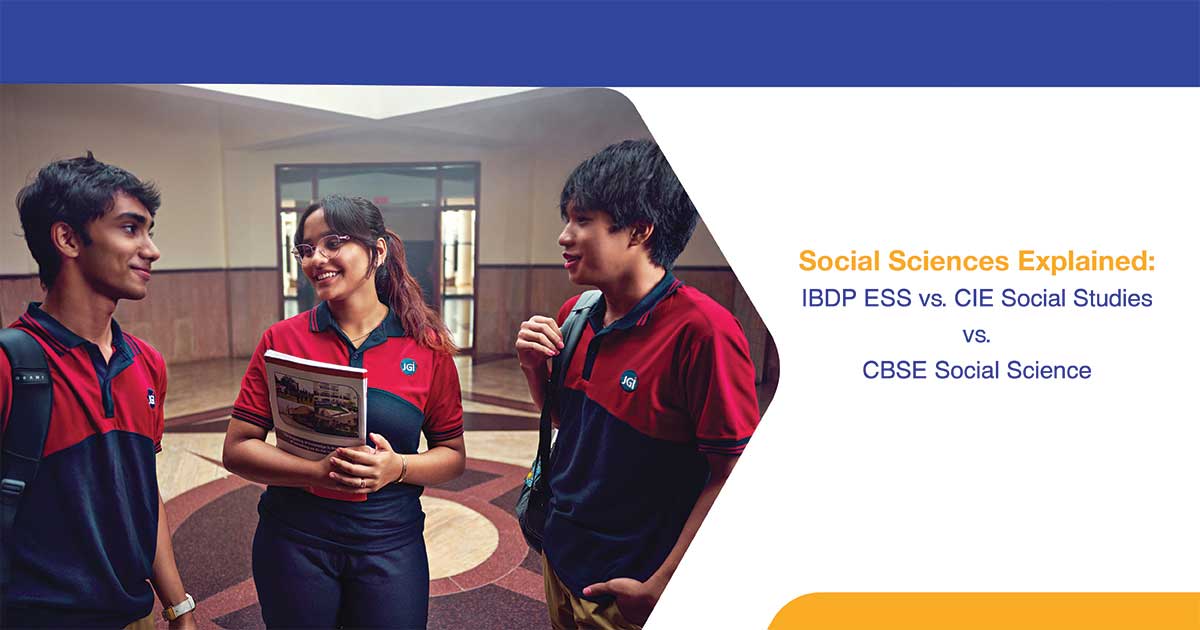

The social science or humanities stream is suited for learners who aim to enter civil services, management, or social sector-related fields. IBDP’s Environmental Systems & Societies (ESS) course is an interdisciplinary course that blends societal issues with different science subjects to teach learners about the environment and sustainability. CIE Humanities and Social Studies subjects are Law, Sociology, Geography, Economics, History, Sanskrit, English General Paper, Hindi Literature, Global Perspectives & Research, Psychology, Classical Studies, and Divinity. CBSE Social Science studies various aspects of human society and culture through subjects such as History, Geography, Political Science, Psychology, and Sociology. Here is a comparison of IBDP ESS, CIE Social Studies, and CBSE Social Science
Curriculum Design and Syllabus: IBDP ESS
The IBDP curriculum ESS syllabus covers topics such as Ecosystem and Ecology, Biodiversity and Conservation, Water and aquatic food production systems and societies, Soil systems and terrestrial food production systems and societies, Atmospheric systems and societies, Climate change and energy production, and Human systems and resource use. In the High Level (HL) ESS course, learners will study three additional courses -
Learners will take two written assessments, and they have to write a research essay in HL.
Curriculum Design and Syllabus: CIE Social Studies
In CIE programme, learners must study at least three subject groups and write the Cambridge International Project, which is a 5000-word written project. Students must also appear for the Cambridge Global Perspective, which is a skill-based programme to present a group project. Cambridge International has a linear assessment model with exams at the end of the course. In CIE, learners can take three assessments in three ways -
Curriculum Design and Syllabus: CBSE Social Science
In the CBSE social science curriculum, there are mandatory and elective subjects -
| Mandatory | Elective |
| History, Political Science, Language (English and another Elective Language), Geography | Psychology, Economics, Entrepreneurship, Fine Arts, Legal Studies, Mathematics |
The two years of high school are divided into four semesters and there will be one written exam at the end of every semester. The 12th Board exam is the final exam taken at the end of the year. It is an external exam that will be conducted and assessed by the Board. Students have to submit a project for the compulsory papers, which will carry 20% weight of the total marks.
Courses: IBDP ESS vs. CIE Social Studies vs. CBSE Social Science
IBDP ESS is an alternative for learners who do not wish to pursue Pure Science subjects. Since IBDP is an interdisciplinary programme, learners can combine Social studies, Science and Commerce courses and not adhere to strict demarcations between the three branches. CIE requires learners to choose three courses in A-levels, and they can choose these from any of the streams. In CBSE curriculum, students only choose Humanities courses if they opt for the Social Science stream. In all, a learner can take up to 6 subjects and a minimum of 5 subjects for 11th and 12th grades.
Scope after 12th - IBDP ESS vs. CIE Social Studies vs. CBSE Social Science
IBDP, CIE AS and A levels, and CBSE 12th Board are all pre-university programmes, and the course selection and results will have a bearing on university programme admissions. Social Studies students can pursue college programmes such as -
Along with the 12th final exam results, learners will have to take additional entrance exams such as SAT, CAT, CET, CLAT or university or course-specific entrance exams to qualify for a college programme.
Final Thoughts:
While selecting courses for the pre-university course, learners in bear in mind the course requirement of the university programme to which they plan to apply. For all three Boards, to excel in the programme, the learner must ensure efficient time management and organisation to do well in the programme. Since the course load will be high, the students must strike a balance between the project, exam preparation, presentations, and preparation for entrance exams.
11th and 12th grade are critical years for any student as their course selection and performance will determine their career path. Regular self-study, timely completion and submission of projects and assignments, and planning will help one mitigate the stress and manage their academic rigours.
Recent Blogs
Site Designed and Maintained By : Office of Communications, JAIN Group All rights reserved.